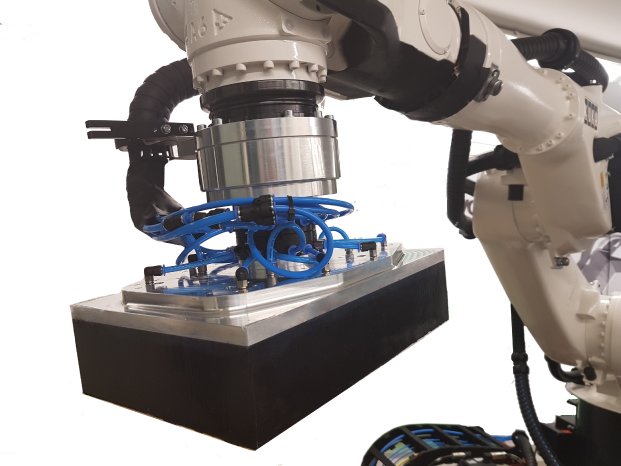Already well established in the technology portfolio for the automated production of complex fiber components of small to medium sizes, Fiber Patch Placement now advances to produce also larger components, in particular for aerospace applications.
“Since we introduced the concept in 2018, various projects with aerospace customers have given rise to the idea of scaling up big time – relating to both patch and component sizes. And big time means 50x as of today – we might go even larger in the future”, explains Dr. Neven Majic, Executive VP of Cevotec.
For some months now the concept “50x” is taking shape – SAMBA Step L is set up in the cevoLab near Munich, Germany. The system features a 6-axis pick-&-place robot mounted on a linear axis. “The increased range of the robot allows us to deal with typical part sizes of aircraft components”, continues Dr. Majic. “Adapted to the specific component sizes, we also scaled the patch grippers to process patches up to DIN-A4 size (approx. 200 mm x 300 mm).”
To enable maximum flexibility in the development process, predefined patches of different sizes and materials can be fed individually to designated pick-up positions. A smooth deposition of large patches on curved surfaces is realized by a special roll-placement feature. This new patch deposition strategy contributes significantly to the quality of large patch laminates and, depending on the application, reduces or prevents laminate air enclosures.
The scaled patch sizes of SAMBA Step L are also supported by the FPP-specific software ARTIST STUDIO through new features. To ensure a precise laminate design with larger patches on curved surfaces, the software now uses an integrated draping algorithm. This algorithm allows the accurate prediction of patch edges on curved surfaces and reduces experimental draping investigations.
SAMBA Step L is designed for developing automated lay-up processes for large aerostructures, such as spatially curved sandwich structures, with sizes of up to 2 m x 3 m. The system can process the demanding material mix especially found in sandwich components, like carbon, glass, aramid, adhesive, and others. As all SAMBA systems, also SAMBA Step L, feature a self-corrective, real-time process and placement control. These control systems ensure a high precision of the placement and the exact repeatability between one part and the next. In addition, a force sensor has been implemented to precisely control compaction pressures during the placement process.
“SAMBA Step L will be operational for customer projects from spring 2020 onwards in our cevoLab, the Fiber Patch Placement Competence Center”, concludes Thorsten Groene, CEO of Cevotec. “With SAMBA Step L, we are taking a big step forward in our efforts to establish Fiber Patch Placement as standard production technology in the aerospace industry. We see applications in fairings, nacelles, panels, radomes, and many more. The abilities to precisely place auxiliary materials of sandwich structures directly on the core, and remove intermediate debulking steps from the process, prove to be very promising in realizing lower cost structures for the next generation of complex aerostructures.”
Composite producers are invited to get in touch and learn how FPP can save 20-60% in production cost & time. Cevotec offers a suitability and unit-cost analysis for every application upfront at no cost. Visitors at this year’s JEC World (March 3-5, 2020 in Villepinte, France) can meet Cevotec and their management team personally in hall 5 at booth Q80.


